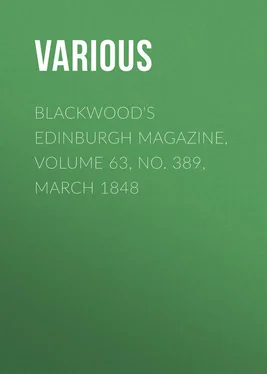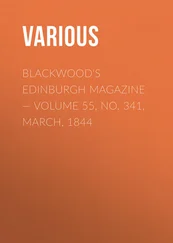Various - Blackwood's Edinburgh Magazine, Volume 63, No. 389, March 1848
Здесь есть возможность читать онлайн «Various - Blackwood's Edinburgh Magazine, Volume 63, No. 389, March 1848» — ознакомительный отрывок электронной книги совершенно бесплатно, а после прочтения отрывка купить полную версию. В некоторых случаях можно слушать аудио, скачать через торрент в формате fb2 и присутствует краткое содержание. Издательство: Иностранный паблик, Жанр: periodic, foreign_edu, Путешествия и география, на английском языке. Описание произведения, (предисловие) а так же отзывы посетителей доступны на портале библиотеки ЛибКат.
- Название:Blackwood's Edinburgh Magazine, Volume 63, No. 389, March 1848
- Автор:
- Издательство:Иностранный паблик
- Жанр:
- Год:неизвестен
- ISBN:нет данных
- Рейтинг книги:3 / 5. Голосов: 1
-
Избранное:Добавить в избранное
- Отзывы:
-
Ваша оценка:
- 60
- 1
- 2
- 3
- 4
- 5
Blackwood's Edinburgh Magazine, Volume 63, No. 389, March 1848: краткое содержание, описание и аннотация
Предлагаем к чтению аннотацию, описание, краткое содержание или предисловие (зависит от того, что написал сам автор книги «Blackwood's Edinburgh Magazine, Volume 63, No. 389, March 1848»). Если вы не нашли необходимую информацию о книге — напишите в комментариях, мы постараемся отыскать её.
Blackwood's Edinburgh Magazine, Volume 63, No. 389, March 1848 — читать онлайн ознакомительный отрывок
Ниже представлен текст книги, разбитый по страницам. Система сохранения места последней прочитанной страницы, позволяет с удобством читать онлайн бесплатно книгу «Blackwood's Edinburgh Magazine, Volume 63, No. 389, March 1848», без необходимости каждый раз заново искать на чём Вы остановились. Поставьте закладку, и сможете в любой момент перейти на страницу, на которой закончили чтение.
Интервал:
Закладка:
We have all an interest in this question, for a descent may be made any where. We have not even the benefit of ships to protect us here in the North; and three or four French frigates would, we apprehend, find little difficulty in effecting a landing in the Forth. Will Mr Cobden be good enough to favour us with his opinion as to the course we should pursue, supposing such a calamity to happen? A simultaneous attack may be made on the south of England, and the Castle and Piershill barracks emptied for the purpose of reinforcing Portsmouth, too weak to maintain itself without their aid. Would he advise us to resist or succumb? Shall we throw ourselves under the protection of our friend George M'Whirter, W.S., and the Edinburgh squadron of the Royal Mid-Lothian Yeomanry? Shall we sound the tocsin of war, and call out Captain Haining with his reserved band of twenty police, all fierce and furious for battle? Shall we persuade the Archers to string their bows, and compete for the Goose medal with a fire-eating Frenchman as the butt? Shall we barricade Leith Walk, block up the Granton Railway in the teeth of a suspension and interdict, and contest, to the last drop of our blood, the possession of every house in Inverleith Row? May we calculate upon any support from the middle districts of England in the event of such a calamity? Will Mr Bright array himself in drab armour, and come to our rescue, with Welford the flower of chivalry, who has a special objection to guns? Can we depend upon Cobden himself? Will he pledge himself to back us at our need with an overpowering army from the factories, clad in calico, and armed with the tremendous and invincible billy-roller? Will George Thompson, chief of a thousand wordy fights, be there, – or Wilson, ex-monarch of the league? Shall we send them the beacon blaze, or – faster still – the telegraphic signal to the south imploring immediate succour? Or shall we trust to their own noble impulses, and hold —
Ye need not warn the Cobden clan,
That ever are stout and true;
And when they see the blazing bale,
The Brights and Thompsons never fail!
Indeed, if we are to believe the last mentioned gentleman, we have that assurance already, for he has spoken as follows: – "I may venture to foretell that the Free-Trade Hall, of Manchester will be more than a match for Apsley House and the Horse Guards put together;" – a highly satisfactory account of the town which was whilom captured by a sergeant!
Upon the whole, unless we can come to a serious understanding with Manchester, we have grave doubts as to the propriety of offering any very obstinate resistance. If we are to do it, we must send off all the women to the Trosachs by the Scottish Central Railway, and perhaps it would be as well for all of us to join the Celtic Society, and fight the battles of our country in the pass of Roderick Dhu. An honourable capitulation, on the understanding that the French were to behave themselves, would probably be the wisest course we could pursue under the circumstances. We love George M'Whirter, and have every confidence in his valour, but we could not bear to see him gasping in his gore; and therefore, unless the regulars are forthcoming, or the Manchester legion on their way, he had better fall back with his comrades upon the western warriors of Dalmahoy. The number of our guardians of the night is at present so small, that we positively cannot afford to spare even one of them as food for powder. It would, we fear, be imprudent to risk the fate of the Scottish capital upon the issue of a combat between our dashing Toxophilites and a body of French artillery, and we are reluctantly compelled to admit that there was some truth in Major Dalgetty's sarcasm against bows and arrows. And now, having gone over the catalogue of our available native forces, which is not quite so long as the Homeric muster-roll of the ships, will any body tell us what we are to do? It would be a sore humiliation were we compelled to illuminate Holyrood, and give a grand ball in honour of the Duc D'Aumale, and our other ancient and now redintegrated allies. But if you abolish the British uniform, and allow the French to supersede it, what else can you expect? We want to be loyal if you will only tell us how – if not, we see nothing for it but the illumination and the ball.
Mr Cobden is pleased to be especially bitter upon the "horrid trade" of soldiering. He characterises it as barbarous and damnable, and would be rid of it at all risks. Now, setting aside the idiocy of his remarks, there is a monstrous deal of ingratitude in this language of the free-trade apostle. Had it not been for our arms, where would our market have been? If we had succumbed to France instead of humbling her at Waterloo – and we presume that Mr Cobden would have preferred the former alternative, since he thinks that the Duke should now be preaching forgiveness for the past – where would have been our trade, and where our exportations of calico? Hindostan is an acquired country, and British arms have opened up the markets of China; and are these commercial evils? Really it is throwing away language to attempt enforcing a point so clear as this. Commerce owes every thing to the exertions and protection of that military power which these purblind theorists complain of; and were our armaments abolished to-morrow, we should look round us in vain for a customer.
And pray what does the arrogant upstart mean by characterising the honourable profession of a soldier as a damnable trade? Does he intend to disgorge his contempt and contumely upon the graves of those who fell on the field of battle fighting nobly for their king and country? Are we now to be told that the names which we have written in our annals, and embalmed in our memories, are detestable and odious as those of homicides and of robbers? If it has come to this, and if public scorn is not roused to overwhelm the man who can conceive and utter such ignoble sentiments, then indeed we may believe that demoralisation has partially done its work, and that the mean ethics of Manchester are henceforward to influence the nation. Not damnable nor horrid, unless justice and freedom be so, is the profession of those who have drawn the sword in the service of Britain, and died for the maintenance of order, liberty, and religion. Other trades there are far more liable to such epithets, but with these, thank heaven! we have but little practical acquaintance. The trade of the greedy taskmaster, who rears infants for his mills, and grinds them to their task until the sinews shrivel up and the limbs are warped into early decrepitude – of him who will not recognise the existence of an imperishable soul within the tender framework of the children whom he makes the victims of his avarice – of the advocate of long hours, because thereby he may keep his human machinery under the complete control of exhaustion, – the trade of that man, we say, though it may be tolerated in a Christian land, is but one shade less horrid, and not a whit less damnable, than that of the slave-trader, who is now chuckling over his living cargoes on the African coast – cargoes for which he is indebted to the enlightened legislation of Mr Cobden and his liberal confederates! Are these the men who are to revile and traduce our army? Faugh! The leprosy of mammon is upon them, and our nature recoils from their breath.
In conclusion, let us express a fervent hope that we have heard the last of this dull and deplorable drivelling. It is to the credit of the Whigs, that, far as they have been led astray by adopting the newfangled political doctrines, rather, as we believe, for the sake of maintaining power than from any belief in their efficacy, they have declined all participation with the Manchester crew in their recent attempt to lower the position and diminish the influence of Great Britain. The chiefs of that party know full well how much we have at stake, and what a responsibility would rest upon their heads, were they to reject the advice of the great captain who has already saved his country, and who again comes forward at the close of life to warn that country of its danger. Mr Cobden likewise is furious with the public press, and charges a large portion of it for refusing to be dragged through the Manchester mire, with having abrogated their duties on this question. We apprehend that the editors of the journals to which he alludes are perfectly competent to the discharge of their duties, without submitting to the dictatorial interference of this very much over-rated and extremely shallow personage. As for the Duke of Wellington, he is not likely to suffer in health or reputation from any want of respect or veneration on the part of Mr Cobden. His fame is too bright to be polluted by such dirty missiles; and the veriest vagabond who broke the windows of Apsley House would shrink from repeating the insults which fell from the lips of the calico-printer.
Читать дальшеИнтервал:
Закладка:
Похожие книги на «Blackwood's Edinburgh Magazine, Volume 63, No. 389, March 1848»
Представляем Вашему вниманию похожие книги на «Blackwood's Edinburgh Magazine, Volume 63, No. 389, March 1848» списком для выбора. Мы отобрали схожую по названию и смыслу литературу в надежде предоставить читателям больше вариантов отыскать новые, интересные, ещё непрочитанные произведения.
Обсуждение, отзывы о книге «Blackwood's Edinburgh Magazine, Volume 63, No. 389, March 1848» и просто собственные мнения читателей. Оставьте ваши комментарии, напишите, что Вы думаете о произведении, его смысле или главных героях. Укажите что конкретно понравилось, а что нет, и почему Вы так считаете.












